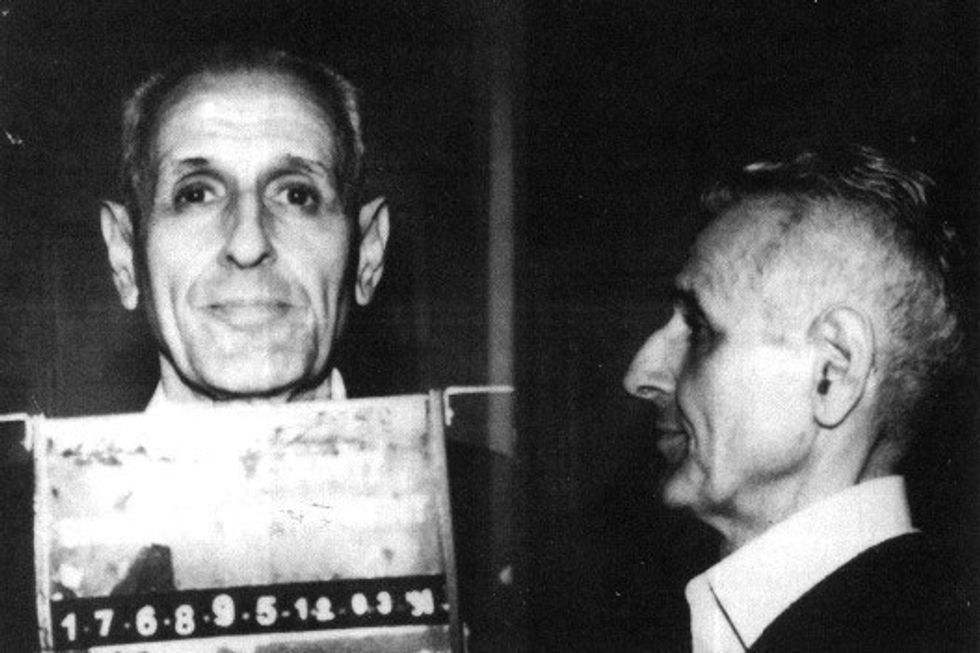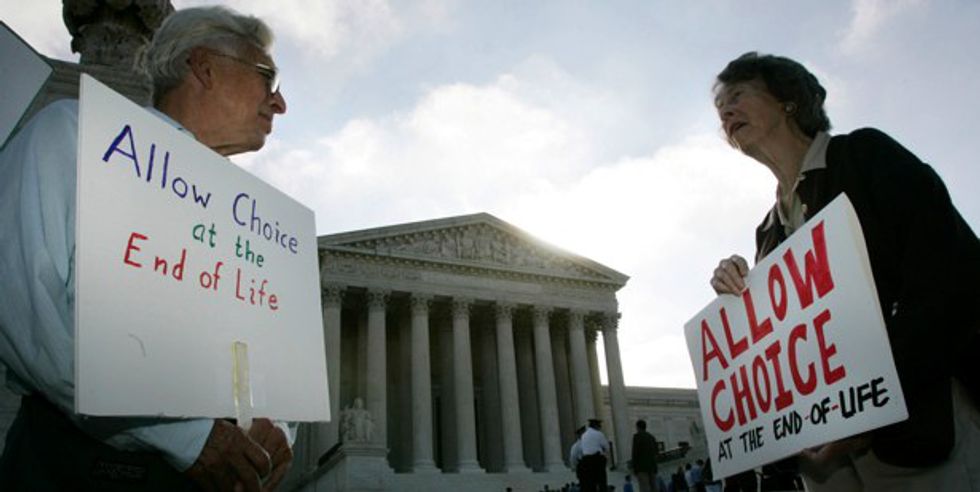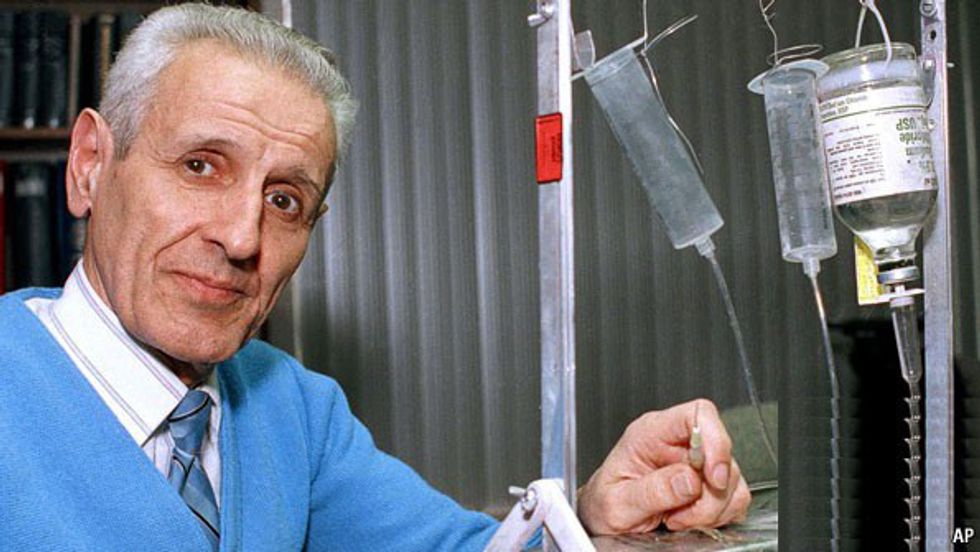On March 26, 1999, American pathologist Jack Kevorkian was arrested on charges for second-degree murder, serving a sentence of 10 to15 years in prison for assisting in the voluntary euthanasia of Thomas Youk, 52, who was in the final stages of Lou Gehrig’s disease. Lou Gehrig’s disease, more commonly known as ALS, is a specific incurable disorder involving the death of neurons, which results in the deterioration of the motor neurons that control muscular movement, difficulty speaking, swallowing, and eventually breathing. Kevorkian and Youk’s family expressed relentlessly the pain and suffering Youk lived through every day of his life, constantly in fear of choking to death on his own saliva due to lack of control of his sphincter muscles along the esophagus. Youk gave full informed consent for Kevorkian to end his life with a lethal injection by signing a consent and acknowledgment form on two separate occasions. Kevorkian indicates that he had assisted in over 130 assisted suicides, but this was the first case in which he physically gave the lethal injection himself.
Jack Kevorkian
Usually, Kevorkian would require the individual who wished to be deceased to push a button, which would administer the drug causing death. Kevorkian filmed the euthanasia of Youk, with Youk’s consent, in order to be tried in court for murder, to force light to be shed on this controversial issue of assisted suicide. He wanted people to begin to think about the issue, force the government to make a decision on whether or not what he did was wrong, and move the debate forward in hopes of granting people the right to a humane death.
I believe that Dr. Kevorkian saved Youk from suffering and fear that Youk felt was worse than death, Youk’s family would agree, and provided him the means to die in a peaceful, merciful way. Although the courts disagreed, I believe that Dr. Kevorkian helped anguished individuals end their lives with human dignity, not commit an act of murder. He was a pioneer for human’s rights who made the ultimate sacrifice for our freedom of choice, giving up eight years of his life stewing in prison for a liberty he felt we all deserve. Passing away on June 3, 2011, from a thrombosis, the epitaph on his headstone reads, “He sacrificed himself for everyone’s rights.”

After the exposure of Kevorkian’s arrest, the concept of physician-assisted suicide has bombarded national news and media for years. Physician-assisted suicide, as defined by the American Geriatrics Society, is when a physician provides either equipment or medication, or informs the patient of the most efficacious use of already available means, for the purpose of assisting the patient to end his or her own life. The United States of America prides itself on the fact that every human being has the right to life, the right to freedom of choice, the right to equality; so then why should the U.S. government deny the right to death? As U.S. citizens, we should be able to have the ability to decide when and how our lives end. I believe that physician-assisted suicide should be permitted in the U.S.; every human being has the right to make choices regarding their life without dictation from the government.
Currently, only four states have legalized physician-assisted suicide (PAS), including Oregon, Vermont, California, and Washington, and Montana has legalized PAS upon court ruling. The majority of people who are considered for physician-assisted death are terminally ill patients with no hope of recovery, having less than six months to live. Individuals that seek PAS typically endure immense amounts of pain and suffering that make death more favorable than life. Individuals requesting PAS are required to verbally request that the wish to end their life on two separate occasions at least 15 days apart, as well as provide a written request for assisted death. Completing this process typically take about six months. I support the extensiveness of this process because choosing to end your life is not a decision to be taken lightly. Six months is an ample amount of time for an individual to be certain of their choice; and I would like to reiterate, it is their choice.

The Ninth Amendment of the U.S. Constitution declares, “The enumeration in the Constitution, of certain rights, shall not be construed to deny or disparage others retained by the people.” This amendment was put into place by the United States government as a safety net to make clear that humans have other fundamental rights in addition to what is addressed in the First through Eighth Amendments. Isn’t the refusal of an individual’s will to end his or her life a violation of our Ninth Amendment rights as a U.S. citizen? Passing a law that prohibits such decisions is only a mechanism used by the government that blocks the ability to exercise our rights. Just because the law may say that a certain act is illegal does not make that act a crime; it just disables you from exercising your rights.
As Jeremy Bentham, a famous British philosopher, once said, “Every law is an infraction of liberty.” It is not illegal to commit suicide in the United States, so I am baffled at the fact that the government feels entitled to put limitations on an action that is not illegal. The concept of death varies from person to person taking into account their religious views and personal beliefs. Not everyone views death in a negative light, but I cannot help but feel that the U.S. government’s refusal of PAS implies that death must be viewed as a sin. Is death really a sin? Sure, maybe to some individuals, but maybe others view it as a beautiful crossing from one realm of living to the next. This is a perfect example of a violation of the Ninth Amendment, since the government is taking away our fundamental right to be able to decide for ourselves whether or not death is a sin.
Jane St. Clair, author of the book "Walk Me to Midnight," issued an article in response to the state of Washington putting assisted suicide on the ballot in November 2008, which lists 30 reasons why she believes that PAS should be illegal. Anti-assisted dying advocates like herself seem to think that we already hold the power to commit suicide, which is true, but the issue is not about whether or not we have the ability to commit suicide; it is about the way in which we can do so. I strongly believe that if someone is determined to end their life, they are going to do so; most likely in a way that strips them of their humanity.
Statistics show that suicide is a daily occurrence in the U.S. The Suicide Awareness Voices for Education reports that 105 people die from suicide every day. In 2013, the American Foundation for Suicide Prevention reported 41,149 suicides, making suicide the 10th leading cause of death for Americans. The numbers reported for this year indicate that someone in the U.S. dies from suicide about every 12.8 minutes. If we cannot deny the inevitability of suicide occurrences, I believe that giving individuals the option to humanely end their life creates an alternative to such drastic measures that are typically taken with self-attempted suicide. Self-attempted suicide has the potential to be unreliable, extremely painful, messy, and disturbing.
Many anti-PAS advocates fear that giving people the option for PAS would create a societal approval of suicide. This particular stance perplexes me. Doesn’t the fact that suicide is currently legal in the United States already create that sense of acceptance towards those who wish to commit suicide? In the 1960s almost every state had laws criminalizing suicide, but by the early 1990s, only two states still list suicide as a crime. Forty-eight out of the 50 states revoked laws forbidding suicide because they realized that it was hugely unethical for the state to be the only power that has the right to take a life. Lifting the laws criminalizing suicide already created a societal approval that the individual has the right to commit suicide, so permitting PAS cannot create a societal acceptance that already exisits. Legalizing PAS means that the government is not blind to the fact that suicides occur, and is willing to respect our right to life, liberty, and the pursuit of happiness, as well as our autonomy regarding personal life and death decisions.
Jane St. Clair also argues that assisted suicide is asking too much of loved ones and can leave them traumatized. The reality is that any death can leave loved ones traumatized. That does not just apply to assisted suicide. I would imagine it would be much more traumatizing to come home from work one day to find a loved one overdosed on pills or having hung themself, then to be aware that they are going to end their life and have the ability to properly say your goodbyes. Being aware of death before it happens will definitely still be hard for the deceased’s loved ones; however, I think it is much easier situation to cope with than the alternative.
A perfect example refuting Clair’s claim is Youk’s family, who fully supported Youk’s decision to end his life and praised Dr. Kevorkian for assisting him in doing so. This does not make them terrible family members, but it indicates that they understood how much Youk was suffering and could put their own feelings aside in order to support Youk’s happiness. Based on the interview conducted with Youk’s family on television’s "60 Minutes," you could see the tremendous loss the family endured having to depart from Youk, but you could also see the relief they felt know that Youk was able to peacefully escape from his terminal suffering.
When I was 11 years old during a family trip to Key West, Florida, my grandfather told my father and stepmother he had been diagnosed with Stage III prostate cancer. This was the first time I had ever seen my father cry. As the year went on, my grandfather grew sicker and sicker, eventually moving with my grandmother to my aunt’s house in Maine where he was confined to a bed in their basement, constantly receiving care from an in-home nurse. Eventually, the doctors told my family that there was nothing else that they could do and to expect my grandfather to die within the next two weeks.
My father and I sorrowfully ventured up to Bangor, Maine, to say our goodbyes later that week. I will never forget the sight of my grandfather when I first arrived to Maine during his last few days. He lay in his bed looking like the life had been sucked out of his every cell, unable to speak anything but the exhausted whisper of a few clustered words, and a gaze in his eyes that housed the doorway into a soul that has been overworked and suffering for too long. The man who lay in that bed in front of me did not seem like the grandfather who spun me in circles as a kid or the man who began tearing up while I sang the national anthem during my third-grade talent show. The man who lay in front of me seemed like a hopeless man, not the man I had always known.
I was so traumatized by the sight of his suffering, when my father told me to go say my final goodbye, I couldn't do it. I could not bring myself to allow that moment to be the last moment I would remember with my grandfather. Although understanding that I was only a 12-year-old girl who had never dealt with death before, I still have to live my life every day feeling as if I let my grandfather down during his final few moments. I never did see him again when he was alive after that horrific first night in Maine. I loved my grandfather very much and wish more than anything that I did not have to live with such a regret as not saying my final goodbye to a man I had adored so immensely.
I share this story because I feel this situation could have been avoided. My grandfather was experiencing an unbearable suffering from his terminal illness and had constantly apologized to our family for having to see him “like this,” wishing he could just leave us with a suitable reflection of the type of man he had been his entire life. Not only did it pain my family to watch as my grandfather’s health deteriorated, but it also pained my grandfather to know that we were watching him slip down a path of despair and hopelessness.
This is what physician-assisted death should be used for—to minimize the inevitable suffering of not only the patient, but their families, too. If my grandfather had been able to control when he was to pass on, I am convinced he would have departed from this world months before his body had began to fail him. If he were able to have had that choice, I would have never seen death lurking in his eyes and might have possibly been less afraid to say my last goodbye. There are plenty of cases similar to mine where PAS does not harm, but helps a patient and their family. So the government needs to stop being so afraid of death and its implications as a sinful act, start realizing that attempting to dictate how a person can or cannot live or end their life is unethical and unrealistic, and to finally understand that dying is not a crime. Dying is a choice.










































